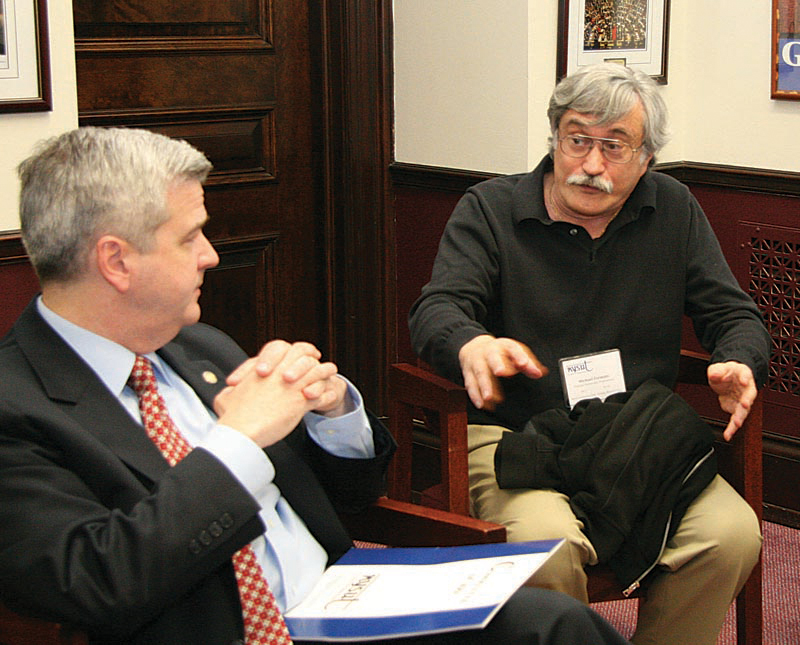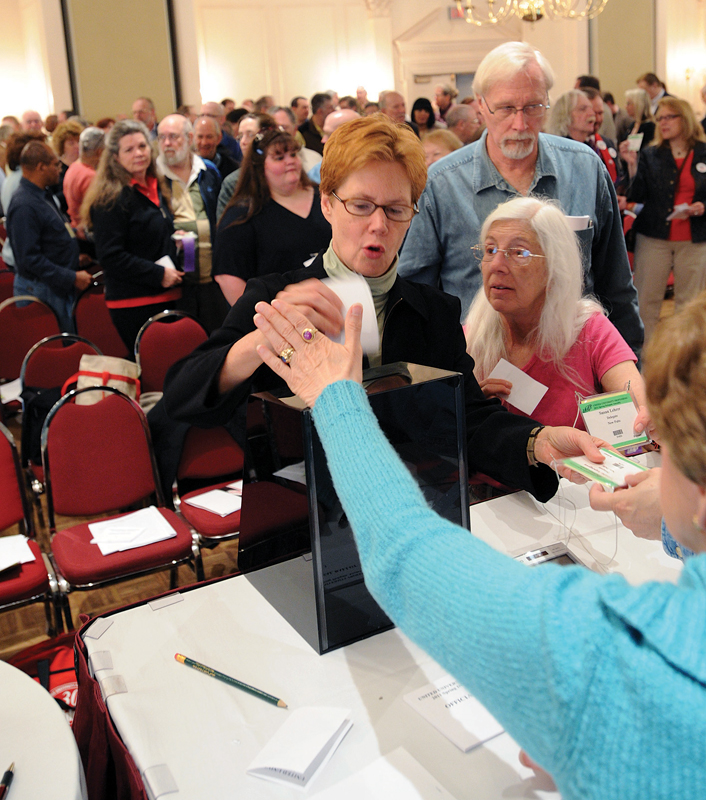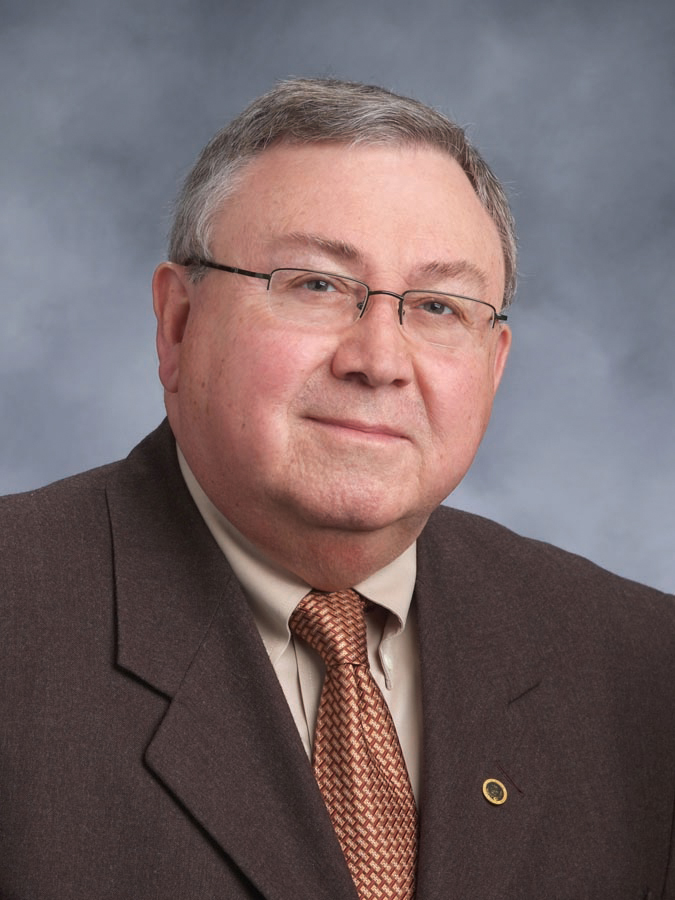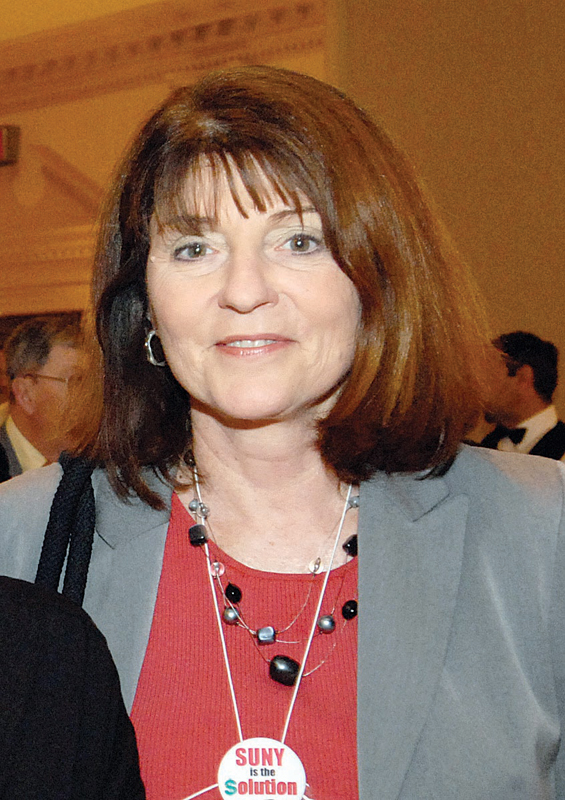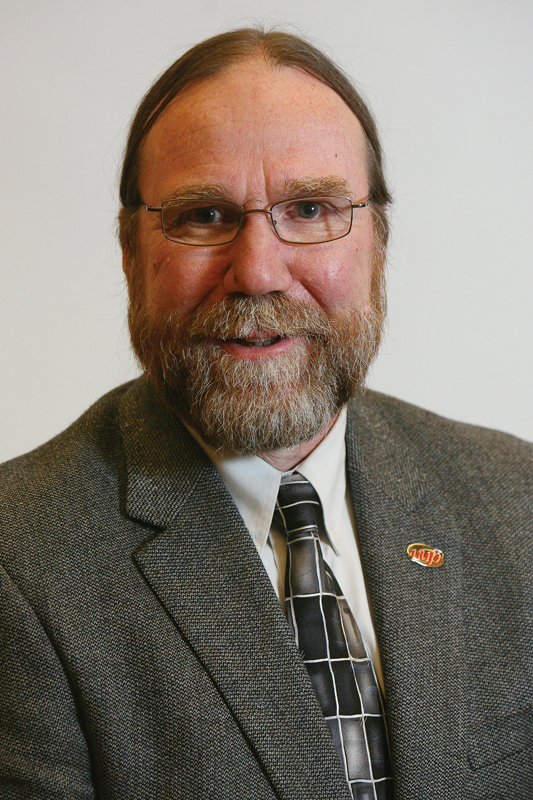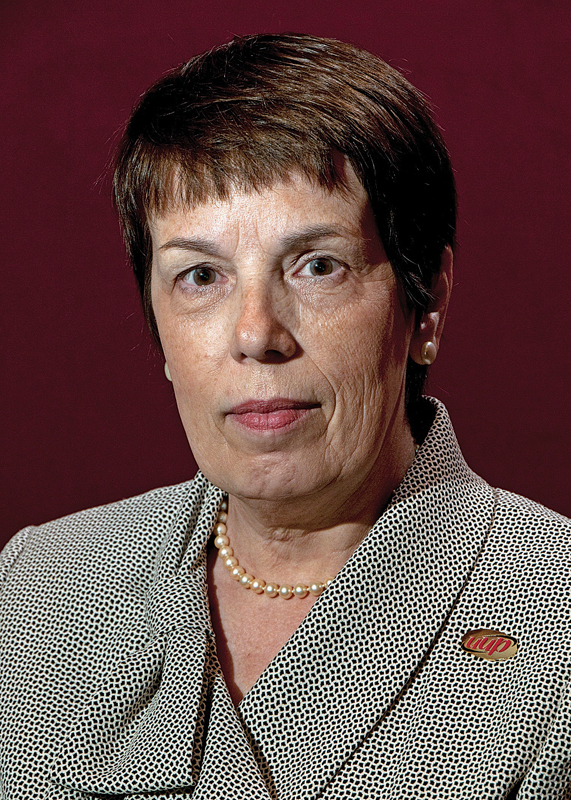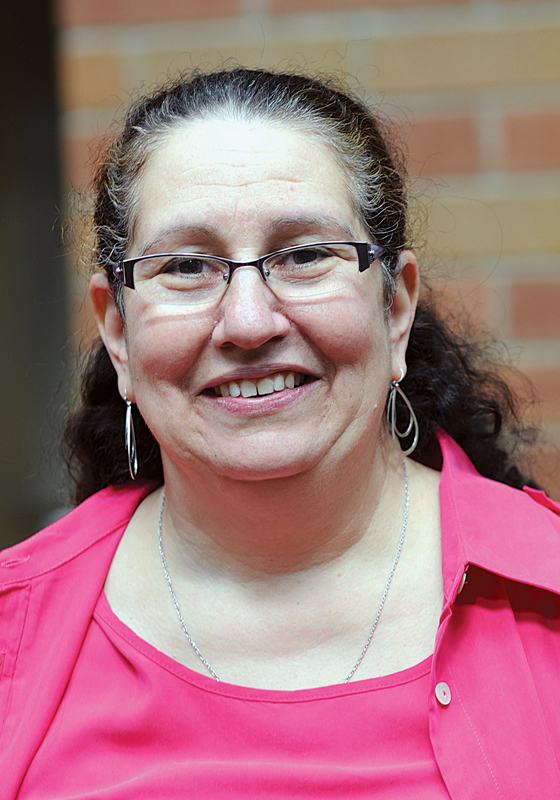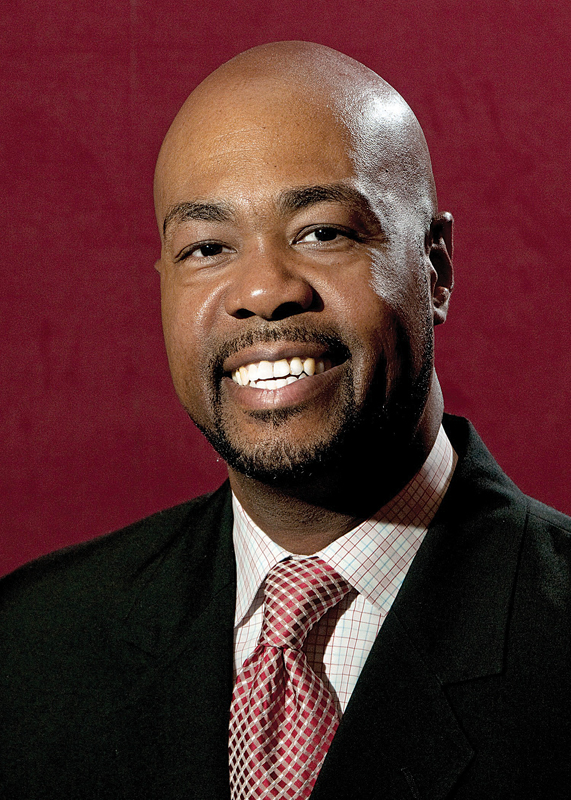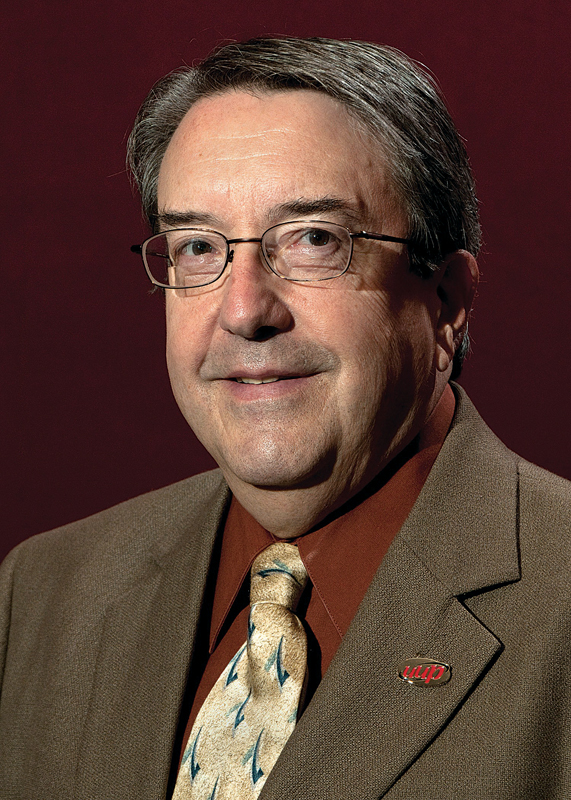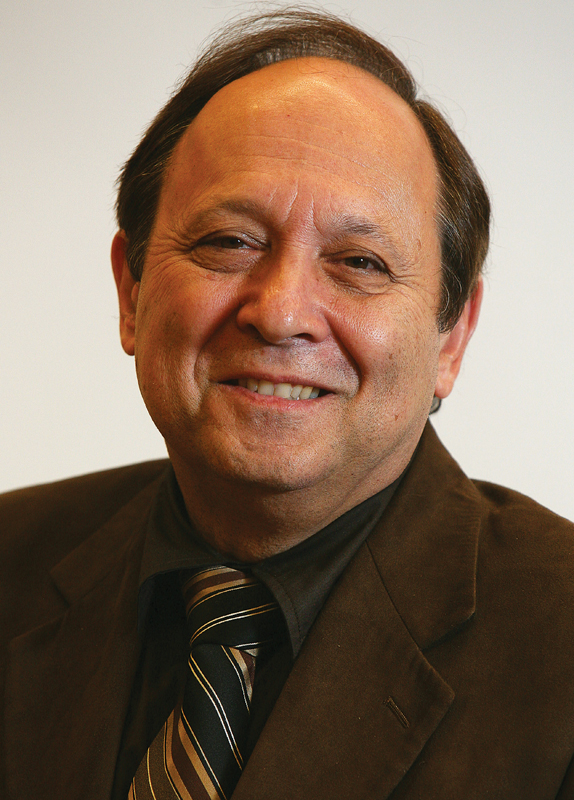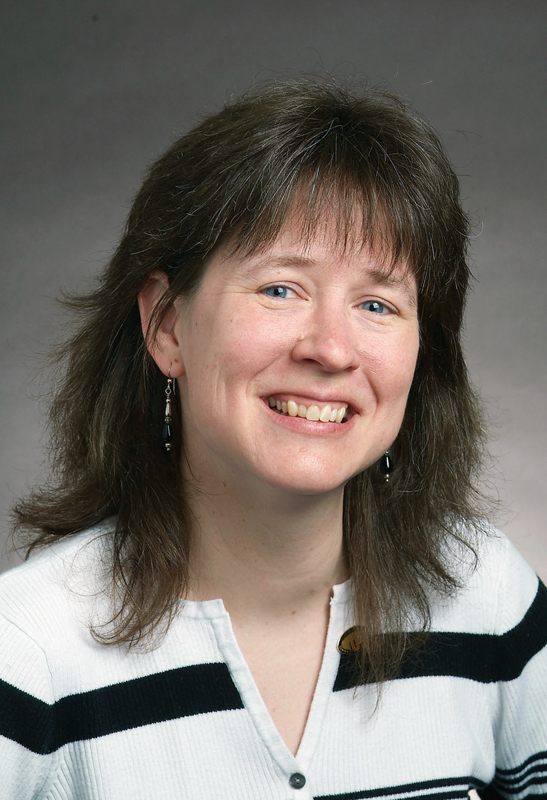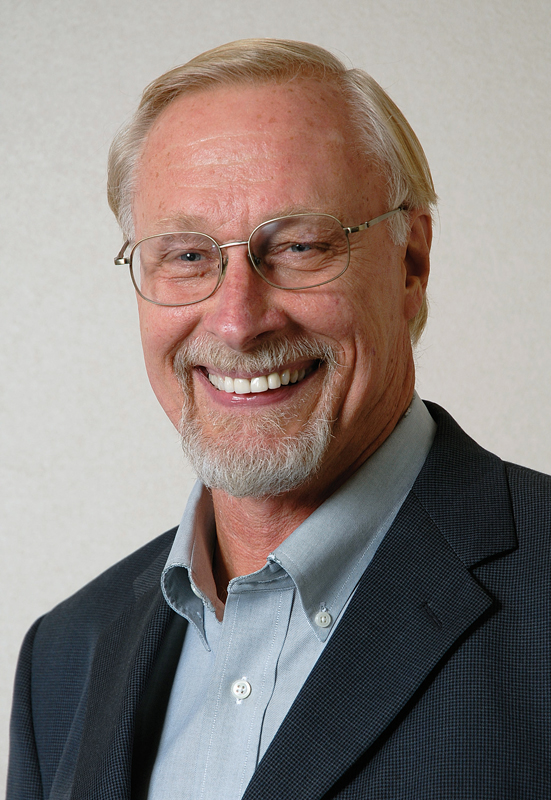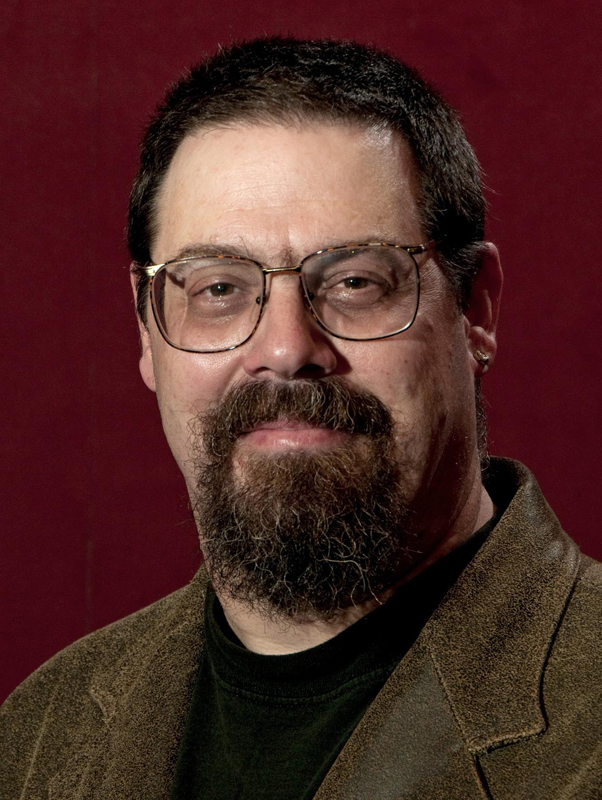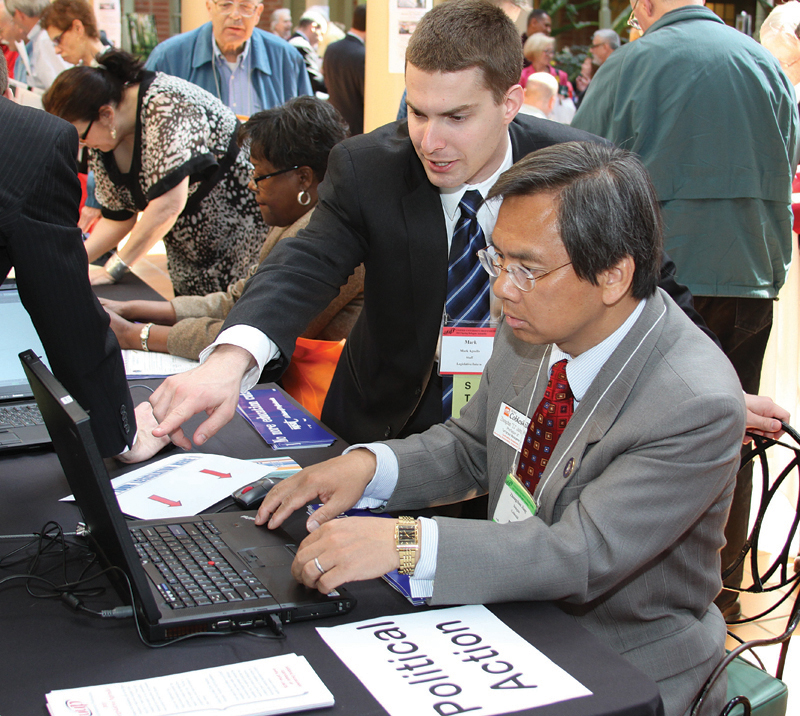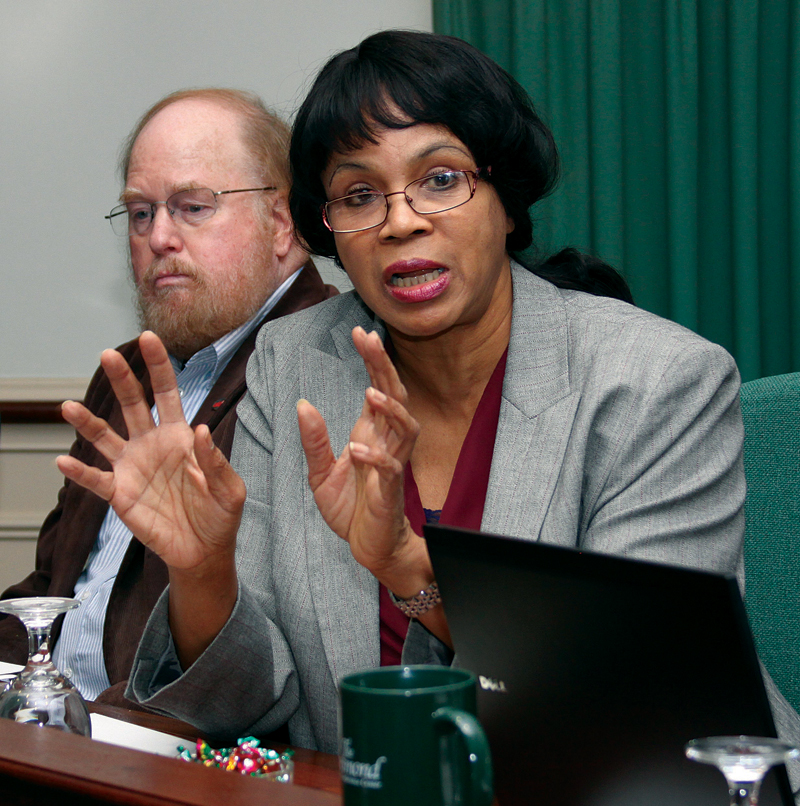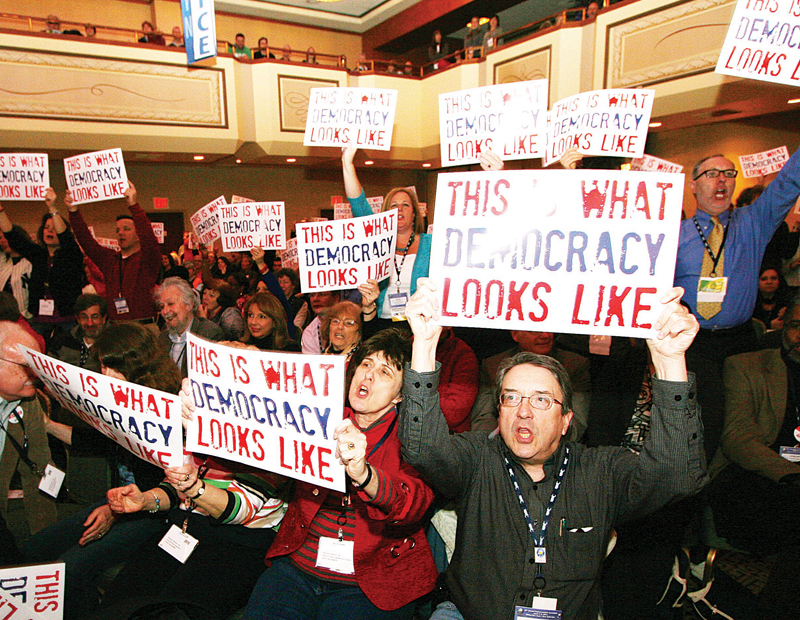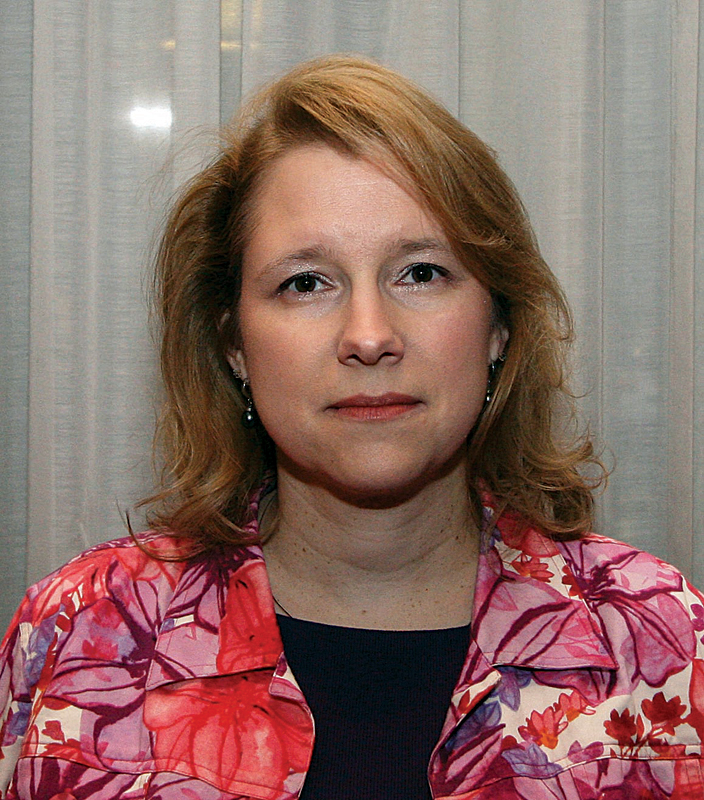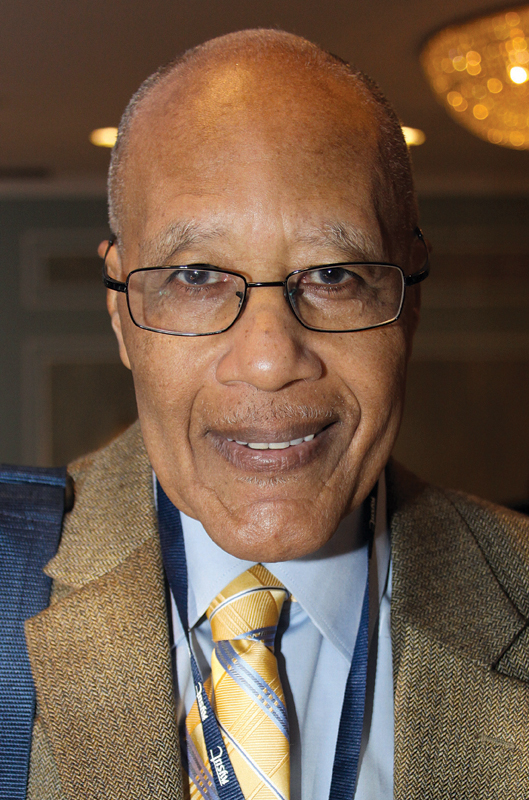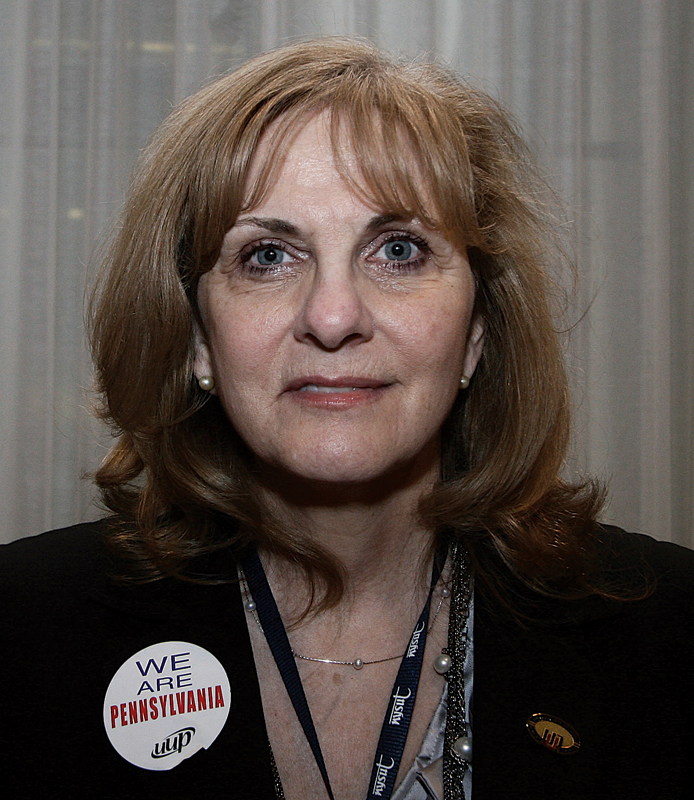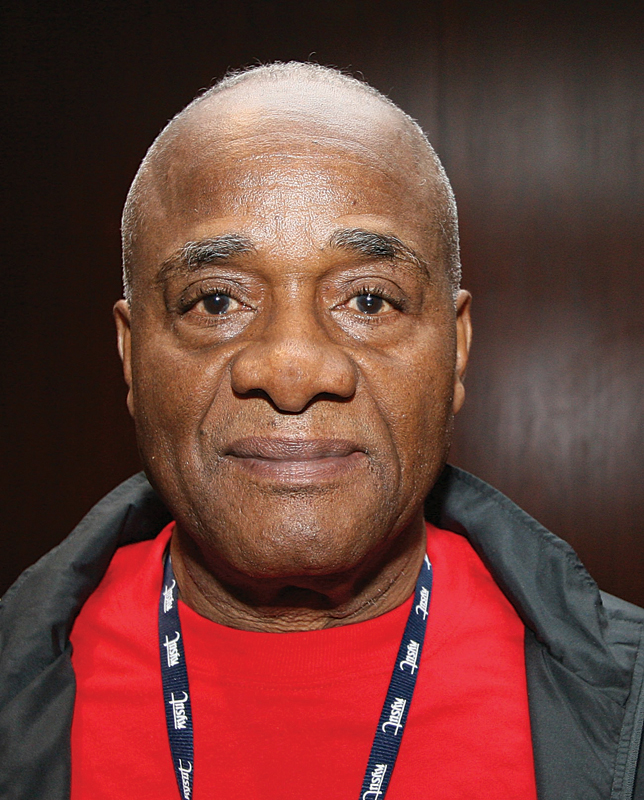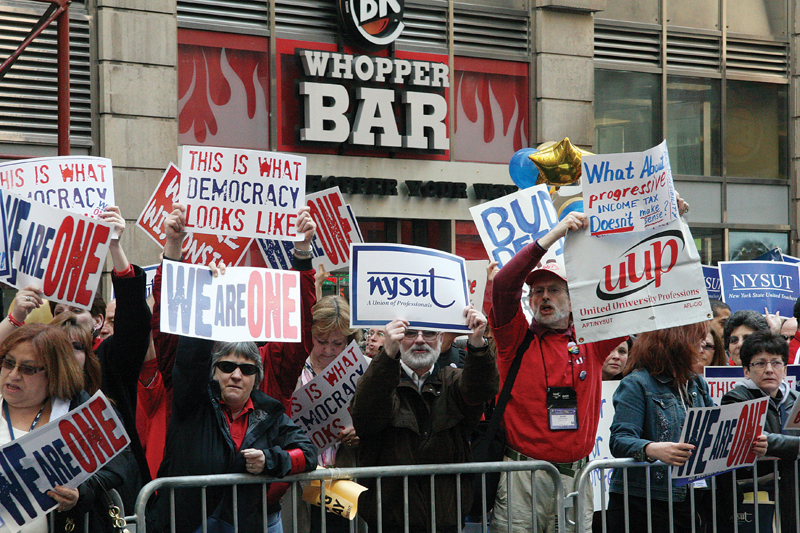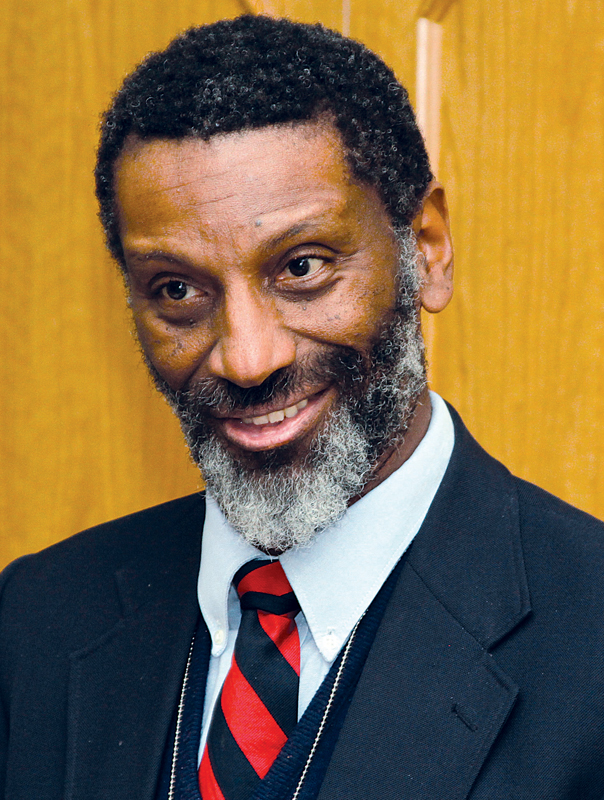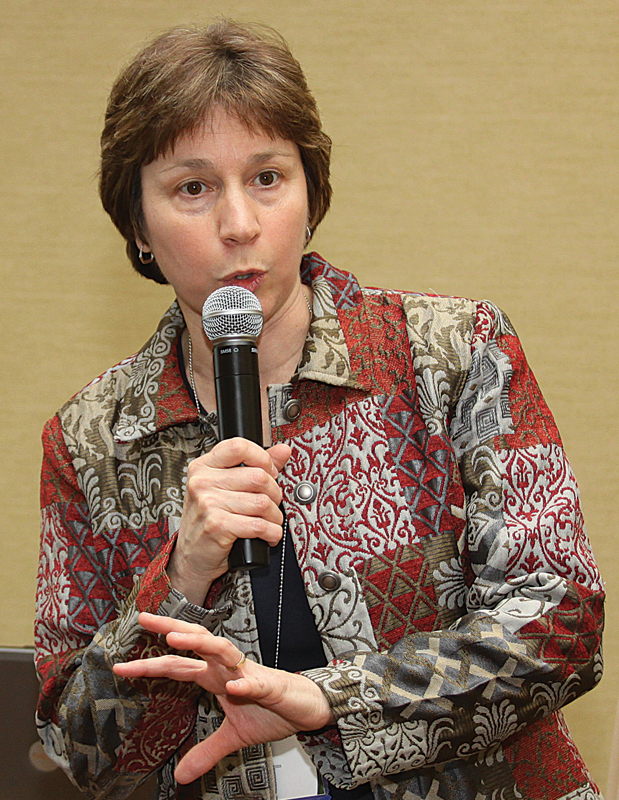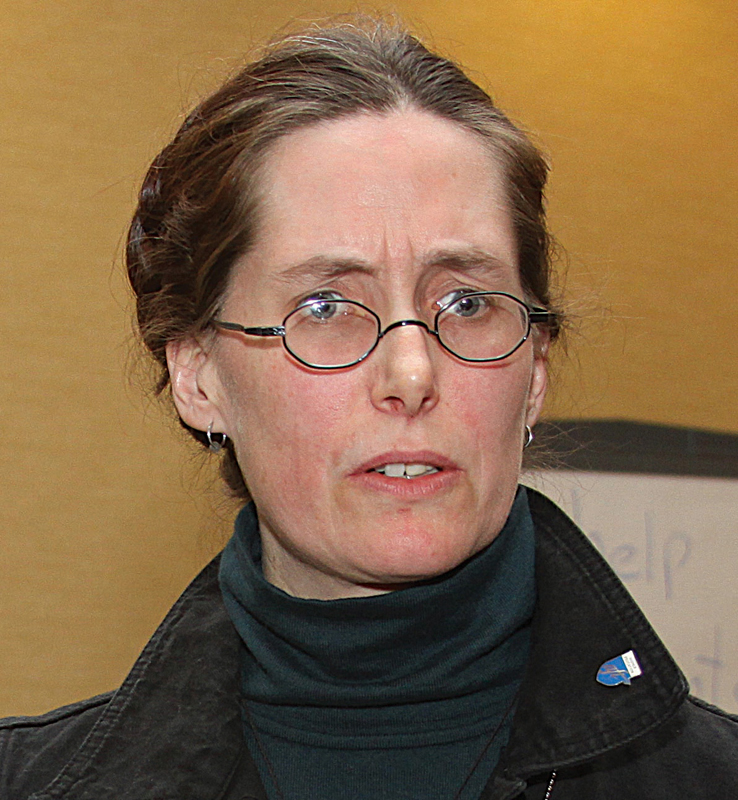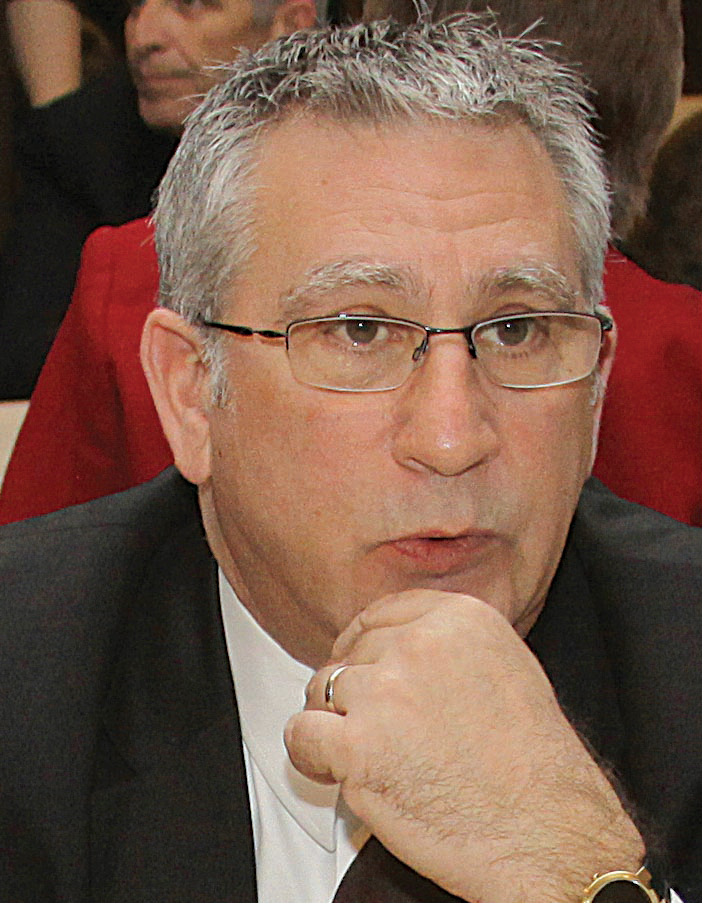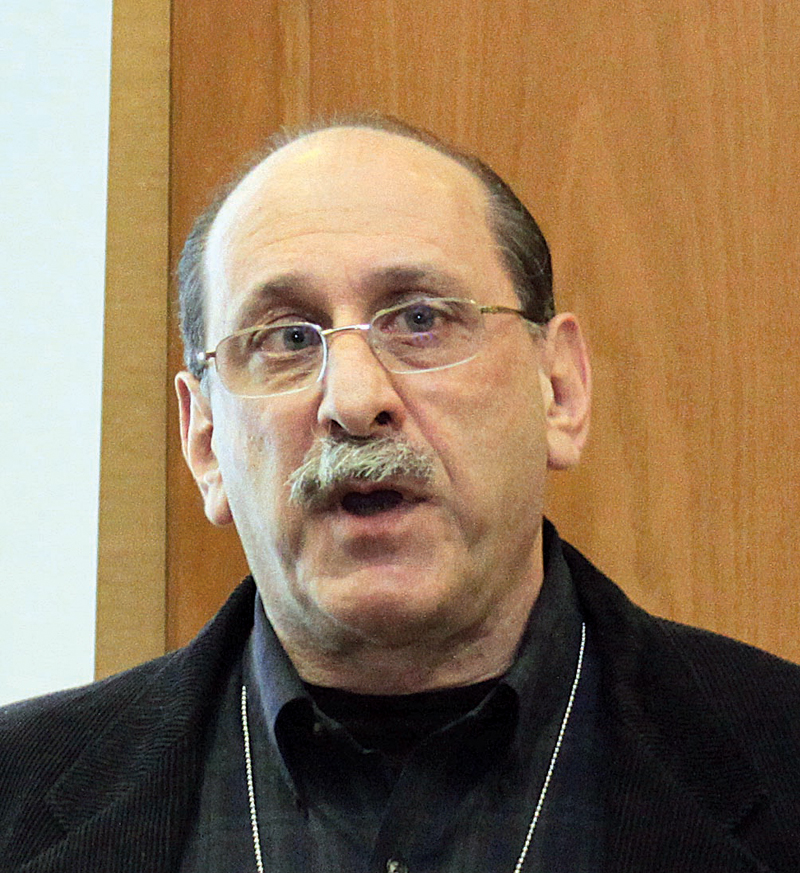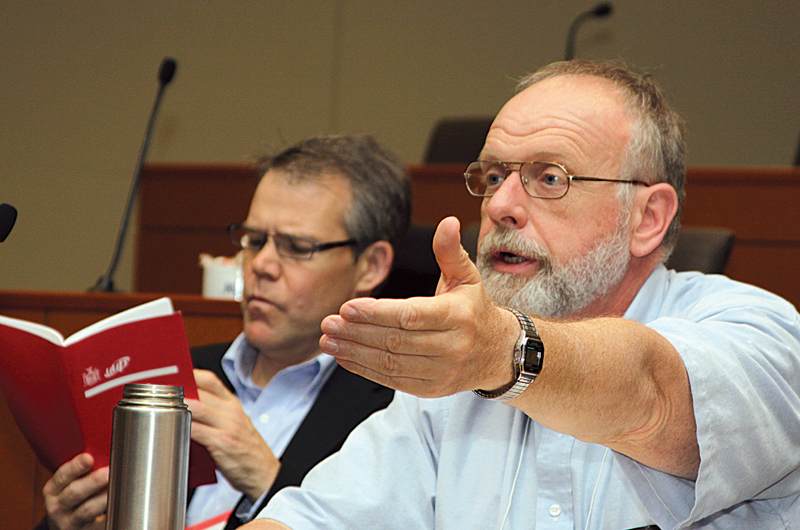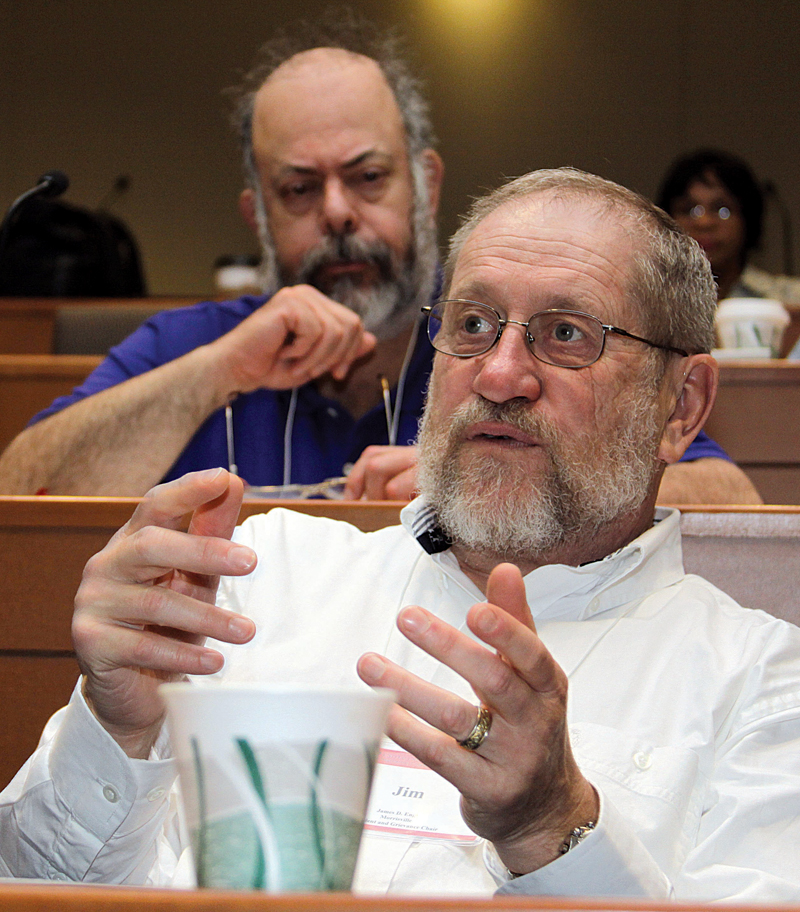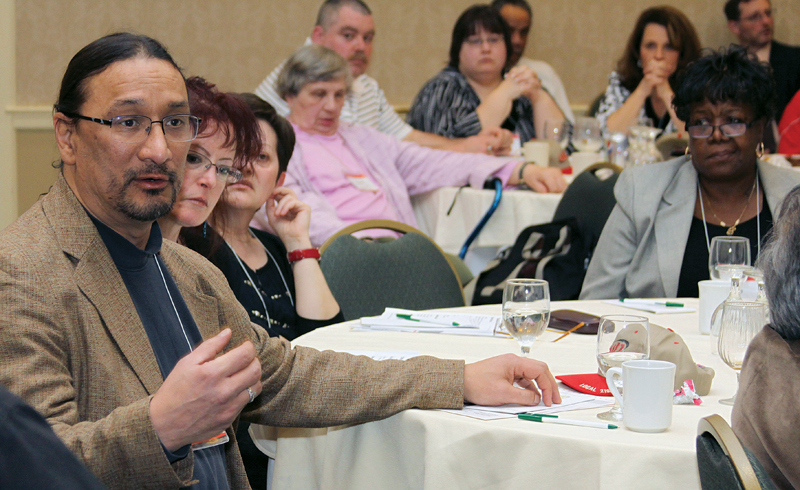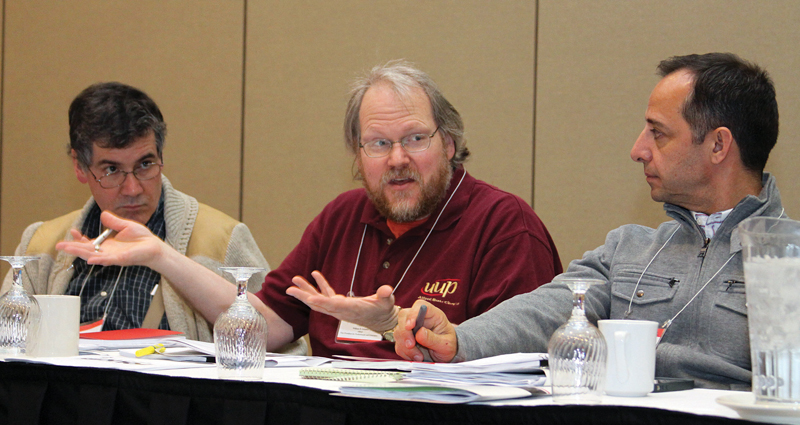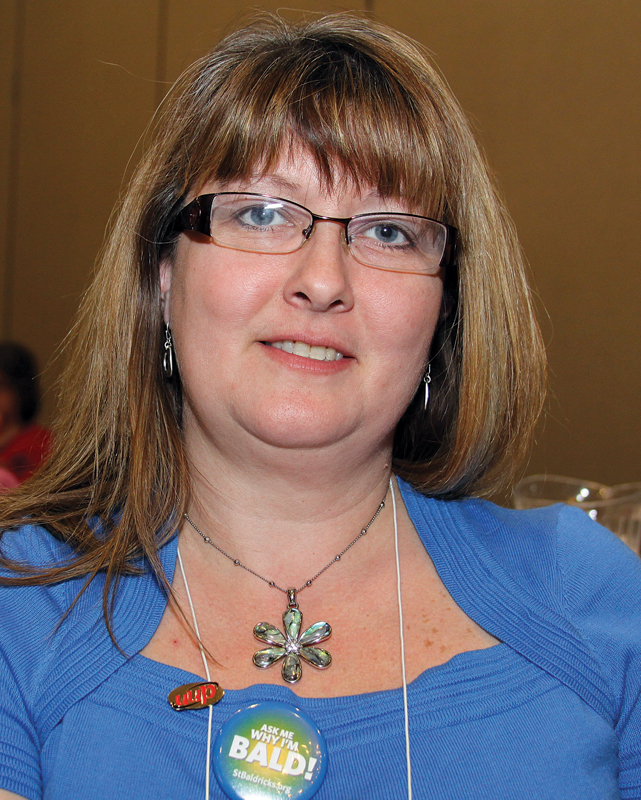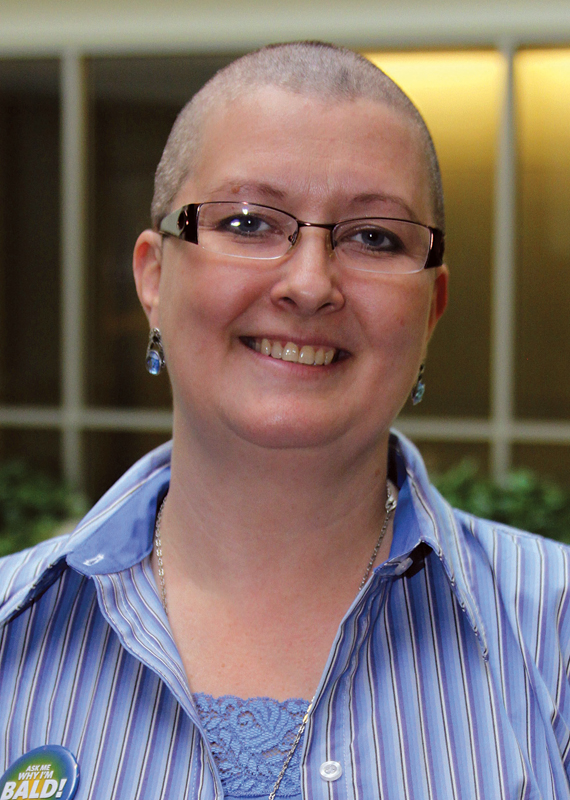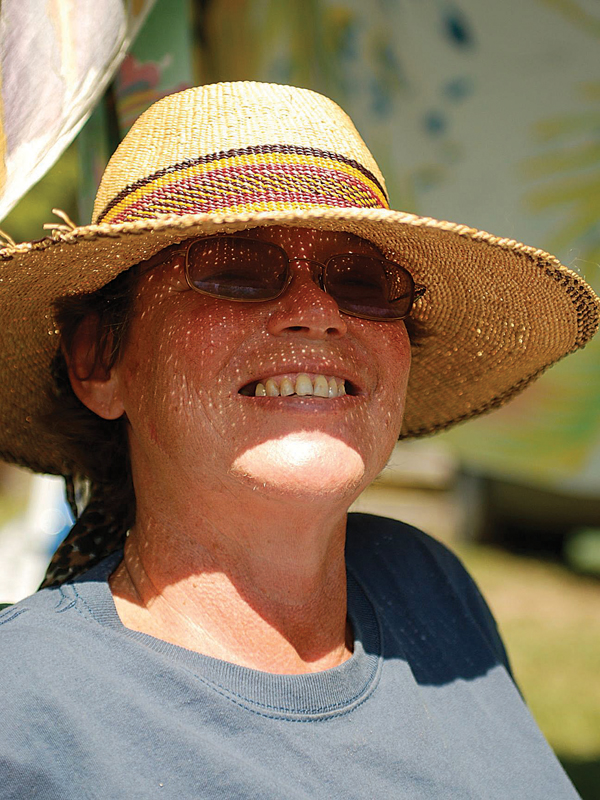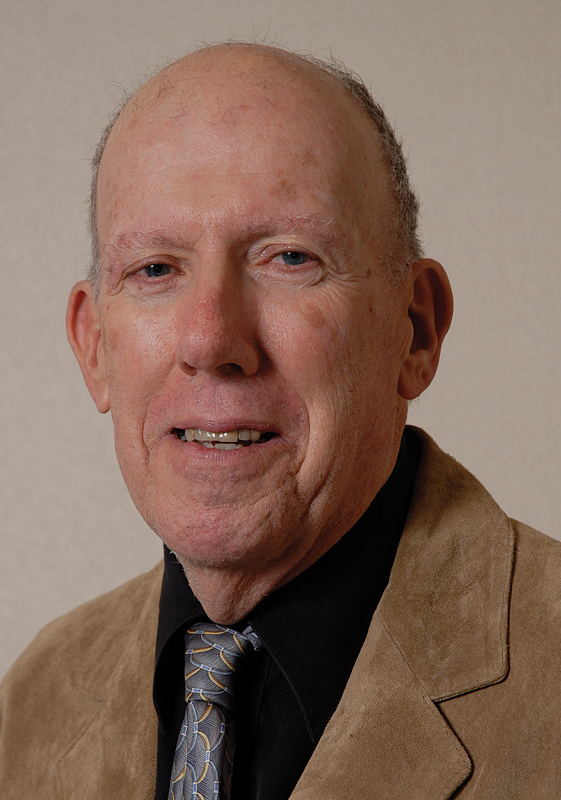|
The governor and state lawmakers reached agreement on a new state budget before the April 1 deadline, but the content of the 2011-12 budget was not exactly what UUP had hoped for. UUP refuses to throw in the towel. With the Legislature scheduled to be in session through June 20, the union looked to galvanize support among lawmakers to pass a supplemental state budget that includes funds restoring SUNY budget cuts. The governor’s proposed $100 million reduction for SUNY remained intact in the final state budget. That raised the total cut to SUNY’s operating aid to nearly $700 million during the past three years, meaning that state support for SUNY has been sliced by one-third. The outcome proved slightly more encouraging when it came to SUNY’s three teaching hospitals, which had faced the elimination of their state support in the governor’s budget. In the final budget, lawmakers restored $60 million of the $154 million cut aimed at the hospitals in the Executive Budget, and the hospitals will amortize—in other words, reschedule—pension payments for a current-year savings of $24 million. “This level of restoration of state support is nearly unprecedented,” UUP President Phil Smith said. “But we need to keep pressing for additional restorations to enable SUNY’s hospitals to continue providing vital health care services for thousands of uninsured and underinsured New Yorkers, as well as work to restore funding to our campuses.” UB 2020 ALTERNATIVE Proponents of UB 2020 fell short of their goal to have the controversial plan included in the budget, but the proposal was still lurking in early May when the governor presented a scaled-down version of UB 2020 called NYSUNY 2020. In contrast to the original UB 2020 plan that called for $5 billion in construction, NYSUNY 2020 would offer up to $35 million in capital funds to each of the four SUNY University Centers as “seed money.” UUP had actively sought to stop UB 2020, and Smith said UUP has serious reservations about portions of NYSUNY 2020. “This proposal could permit the four University Centers to impose differential tuition. That could deny access to tens of thousands of students from low-income households,” Smith said as details of the plan were still emerging. “Potentially, that increased tuition could be used to fund public/private partnerships. We don’t think it’s fair to force students to line the pockets of private businesses.” UB 2020 emerged as one of UUP’s major targets as union advocates headed back to Albany with a revised legislative agenda. SEEKING A REVERSAL OF FORTUNE UUP’s revised agenda also urges lawmakers to pass an amended budget to reverse the massive cuts to SUNY campuses and hospitals. UUPer Barry Trachtenberg of UAlbany presented a personal account of how deeply SUNY has been cut. “When I started in 2003, I was one of five faculty in Judaic studies. Now we’re down to one faculty member—me,” he said during a legislative visit. UUPers also pressed lawmakers to extend the millionaire’s tax to raise additional revenue that could be used to restore funds to SUNY. The union’s advocates planned on pursuing these issues during the NYSUT Committee of 100 Advocacy Day May 10. UNITED FOR HIGHER ED UUP activists also worked for restorations prior to the budget vote. In addition to making personal visits to legislators, UUPers joined nearly 2,000 of their sisters and brothers from NYSUT— UUP’s statewide affiliate—the Professional Staff Congress representing CUNY faculty, PEF and CSEA for “A Rally for Public Ed” outside the state Capitol. UUP President Smith was among more than a dozen speakers addressing the rally on a blustery, late winter’s day. All asked that funding for education be restored in the budget and an extension of the millionaire’s tax. Smith also worked in partnership with SUNY Student Assembly President Julie Gondar. The two co-wrote a letter to the editor of the Albany Times Union calling for adoption of a rational tuition plan for the state university. But Smith cautioned that any such tuition plan must be accompanied by an increase in the maximum Tuition Assistance Program grant. The budget fight is not over. UUPers are urged to send letters to lawmakers via the union’s website and its advocacy site at www.savesuny.org, asking them to restore funding for SUNY and its hospitals in the supplemental budget. — Donald Feldstein |
Author Archives: United University Professions Admin
2011 Spring DA: ‘UUP Delegates set union’s course during policymaking convention
|
Delegates re-elected President Phil Smith, Secretary Eileen Landy and Membership Development Officer Ed Quinn, and sent all but one incumbent back to the Executive Board in union elections held during the 2011 Spring Delegate Assembly (DA). More than 325 delegates attended the two-day DA, held May 6-7 in Albany. They listened to Smith’s update on union issues, such as the newly proposed NYSUNY 2020 plan, and voted on a number of resolutions, including items regarding affirmative action, academic freedom, and the American Association of University Professors (AAUP). Unionists unanimously approved special orders honoring Potsdam’s Ed Alfonsin as UUP?Outstanding Retiree of the Year, and the late Stony Brook delegate Salvatore Lentini for his service to the union. Delegates also collected $1,314 in donations for Alabama tornado victims, dollars that were matched by UUP. ELECTING LEADERS Union elections were center stage at the DA, with multiple candidates vying for statewide offices and eight Executive Board seats. Smith, who faced challenges from Vice President for Academics Fred Floss and Buffalo Center delegate Paul Zarembka, received 171 votes, a majority. Floss got 128 votes, followed by Zarembka with 16 votes. After the elections, Smith thanked delegates for returning him as president, and urged UUPers to unite and move forward. “The voters have spoken; we are all one,” Smith said. “Let’s move on.” In the race for statewide secretary, Landy received 251 votes, while Morrisville delegate Raul Huerta got 61 votes. The tightest race was between Quinn and Alfred delegate Robert Rees for statewide membership development officer. Quinn won a majority by a single vote, 155-154. Empire State College delegate Jacqui Berger is the Executive Board’s sole new member, winning the board’s specialized colleges seat. She joins Edison Bond Jr. of Brooklyn HSC, Caroline Bailey of ESF, Bob Reganse and Mike Smiles of Farmingdale, Plattsburgh Chapter President Dave Curry, Potsdam Chapter President Laura Rhoads, and Brian Tappen of Upstate Medical University as Executive Board at-large seat winners. Executive Board positions carry two-year terms, set to begin June 1. SMITH SPEAKS During his president’s report, Smith urged UUPers to stand together to repel a growing anti-union sentiment that has spread across the country. “We need to be united; we cannot be divided,” he said. He also expressed serious reservations about the NYSUNY 2020 proposal, a scaled- back version of the controversial UB 2020 plan. Smith warned NYSUNY 2020 could allow the university centers to charge differential tuition, which could cut off SUNY access to thousands of students from low-income families. The plan may also permit the universities to use increased tuition to fund public/ private partnerships. Smith noted that this is the 15th version of a SUNY flexibility proposal; UUP has been instrumental in defeating the others. USE SUNY SURPLUS UUP will continue to press SUNY and SUNY schools to use budget surpluses to cover state budget shortfalls, derail retrenchments and nonrenewals, and hire new academics and professionals. SUNY’s $600 million surplus is expected to grow by $120 million annually, more than enough to cover $100 million in state aid cuts in the state’s 2012 budget, Smith said. “The chancellor and the SUNY Board of Trustees have the power,” he said. “They should do the right thing.” RESOLUTION WRAP Delegates referred a proposed constitutional amendment regarding UUP election procedures to the Executive Board, which will create a task force to investigate the issue. Delegates will hear a report on the matter at the 2011 Fall Delegate Assembly. They also approved an Affirmative Action Committee resolution that encourages chapters to appoint affirmative action officers and to consider a constitutional amendment at the 2011 Fall DA to reinforce the election or appointment of an affirmative action officer. The item requires UUP to implement a training program for chapter affirmative action officers, and to develop and publish an affirmative action handbook. Delegates also approved resolutions to: • Condemn the actions of governments in Bahrain, Egypt, Libya, Syria and Saudi Arabia for “excessively repressing” the voices of academics and university students and for persecuting faculty because of their religious affiliations. • Direct UUP’s president to investigate alleged bargaining unit interference involving AAUP. • Offer UUP’s support of Sodexo workers employed on SUNY campuses to ensure them rights to fair wages, benefits and union organizing activities. • Take action to use “all available means” to resolve attacks on the integrity and academic freedom of bargaining unit members teaching online courses. • Oppose a proposed change of U.S. Patent Law from a “First to Conceive” to “First to File” basis to protect UUPers who file patent applications when their work is completed. • Oppose a move by Harper Collins to change the basis of its e-book sales to libraries from outright purchase to a limited use license. • Encourage documents distributed to UUPers be printed using Tahoma 12 point font or in an enlargeable electronic format. • Invite Dr. Jesse Kabwila Kapasula to serve as a SUNY visiting professor until her safety can be reasonably assured. Kapasula, acting president of the Chancellor College Academic Staff Union, was fired by the government of Malawi over academic freedom issues and has received death threats. Highlights of the DA are posted on the UUP website at www.uupinfo.org. — Michael Lisi
Above left, UUP intern Mark Agnello helps Cobleskill delegate Z.J. Jiang send a letter to lawmakers urging them to reject the NYSUNY 2020 bill. Above right, Treasurer Rowena Blackman-Stroud discusses the consolidation of SUNY Downstate Medical Hospital and a private downstate medical facility.
|
2011 NYSUT RA: ‘United We Lead’ UUPers join call to defend workers’ rights
|
In the wake of bitter attacks against unions and collective bargaining rights in a number of states, more than 100 UUP members joined more than 2,000 of their NYSUT sisters and brothers in vowing to fight back. The unionists brought together their collective strength during NYSUT’s 39th annual Representative Assembly, held April 7-9 in New York City. The RA’s theme, “United We Lead,” was a call for unionists to remain united to meet the serious challenges ahead of them. In his State of the Union address to delegates, NYSUT President Dick Iannuzzi detailed the obstacles facing public education and unions, and he warned that the struggle is not confined beyond the borders of New York. “Make no mistake about it, the battle isn’t only in the Midwest. The battle is here in New York as well,” Iannuzzi cautioned. “We see it in attacks on seniority and pensions. We see it in attacks on due process. And make no mistake about it, the battle will be fought here. And the battle will be won here.” SUPPORT FOR UUP UUP got help in its battle against SUNY budget cuts, in the form of a resolution sponsored by UUP passed unanimously by the delegates. The resolution called on NYSUT to work with the governor and the Legislature to ensure that SUNY and its hospitals receive adequate funding to carry out their core missions. Another UUP-sponsored resolution asked NYSUT to seek legislation requiring more transparency and accountability for the SUNY Research Foundation and other SUNY campus foundations. “If we could lift the veil of secrecy surrounding the Research Foundation, it could help us stop UB 2020 because the legislation would shed some light on the activities of the UB Foundation,” UUP President Phil Smith told the College and University Resolutions Committee. The resolution was adopted unanimously. UUP delegates also chose its representatives to the NYSUT Board of Directors. Rowena Blackman-Stroud, Tom Matthews and Ed Quinn were elected by the UUP delegation. UUP President Smith was re-elected by all RA delegates to an at-large board seat. MEETING CHALLENGES UUP members and their NYSUT colleagues applauded a series of speakers who lent their support to the political challenges the labor movement faces. AFT President Randi Weingarten said the tide is turning in favor of labor. “You see signs in store windows and letters to the editor,” she said. “People are saying the same thing; it’s wrong to take away rights, silence voices, crush the middle class and strip workers of their voice and dignity while giving huge tax breaks to the wealthy.” NEA President Dennis Van Roekel said the move to erode workers’ rights is not about economics. “It’s about silencing the voice of unions and the middle class,” he said. NYSUT Executive Vice President Andrew Pallotta fired up the crowd, asking members to not just be in the union, but be the union. “We have not yet begun to fight,” he shouted. “The revolution starts now, and it’s in our own backyard.” UUP delegates like Deb Zinser of Plattsburgh liked what they heard. “The attack on workers upsets me tremendously,” she said. “I’m livid that they feel as though they can take away benefits and bargaining rights of people who have worked hard to get to where they are.” UUPer Bruce Altschuler of Oswego agreed. “All of my colleagues work hard, and no one goes into academe for the money. We do it because we love our work,” Altschuler said. Wasting no time putting their words into action, RA delegates took up a collection to support the AFL-CIO’s Unity Fund. They raised nearly $15,000 and NYSUT added another $25,000 to the Unity Fund’s coffers. — Donald Feldstein |
On the street: How have the attacks on public employees affected you as a union member?
|
‘We Are One’ rally draws 15,000
|
Dozens of UUPers—including every statewide officer—joined nearly 15,000 of their union sisters and brothers at the “We Are One” rally in Times Square April 9. Many of the UUPers marched as a group for 15 blocks to the rally from the site of the just- concluded NYSUT RA shouting, “This is what democracy looks like.” Activists from across the state jammed the sidewalks along Seventh Avenue for more than four blocks south of Times Square for the rally—organized by the New York State AFL-CIO—prompted by the attacks on workers’ rights in a number of states. Those attacks include a new law in Ohio barring unionized public employees from negotiating health care, sick time or pension benefits. In Wisconsin, a new law strips public employees of their right to collectively bargain on anything except wages, and calls for almost all public workers to contribute more to their pensions and health care coverage, changes that amount to an average 8 percent pay cut. UUPer Janie Forrest-Glotzer of Oneonta found it very moving to be part of such a huge gathering to support and affect positive change for the labor movement. “It’s critical for unions to stick together and support one another under the ‘We Are One’ theme,” she said. “Together we support safe working conditions and health care for all.” A lineup of prominent labor leaders energized the crowd, leading them in chants such as “Workers united can never be defeated,” and “Respect our rights.” “We will not be pushed around,” said state AFL-CIO President Denis Hughes. “We will stand up and fight for the middle class. We are the labor movement and we are one.” “What we’re facing is an attack on working conditions,” NYSUT President Dick Iannuzzi said. “We hear this garbage about how it has to do with deficits, but it’s really an attack on collective bargaining.” AFT President Randi Weingarten and NEA President Dennis Van Roekel said unions will not go away in the face of demoralizing attacks. Rather, they have become stronger and more energized. Several speakers directed their attacks against the leaders of Wall Street and the wealthy who are using their clout to gain tax breaks while public workers are being targeted for sacrifices. UFT President Mike Mulgrew said history being made now will be a lesson for future generations. Mulgrew believes that 20 years from now, teachers will be telling the story of how the wealthiest 1 percent of the country tried to take more from the rest of us—and failed. The rally was part of a series of events held in the days around April 4 to honor the legacy of the Rev. Martin Luther King Jr., who was assassinated on that date in 1968 in Memphis. His assassination came one day after he gave a speech to striking sanitation workers who were demanding the right to bargain collectively. — Donald Feldstein
|
AFT Higher Ed Issues Conference: ‘Our work, our union, our students’
|
Union members are making a difference every day. UUPers?and more than 400 of their higher education colleagues from across the country know that only too well—and proved it once again in April during the AFT Higher Education Issues Conference in Philadelphia. Underscoring the theme “Making a Difference Every Day: Our Work, Our Union, Our Students,” participants discussed the growing concerns on college and university campuses nationwide, as well as the all-out assault on unions and workers’ rights. Six UUP members moderated discussions and served as panelists on issues ranging from the role of professionals in student success, to bullying on campus, to promoting faculty diversity. TAKING THE LEAD UUP?President Phil Smith moderated the opening plenary on confronting the fiscal and political crises across the nation. “We have an American public that has been fed a line that public employee pensions and other hard-fought union benefits are to blame for their problems,” Smith said. “America faces real economic and fiscal challenges. Our opponents—now in power—have chosen not to try to solve these problems, but to use their opportunity to destroy us where they can, and to exert as many concessions as possible where they can’t.” Smith set the stage for AFT?President Randi Weingarten, who called on unionists to take a stand for workers everywhere. “I don’t think anyone knew how evil these people are,”?Weingarten said. “These are not the faces of extremists, but of people who took the anxiety of the middle class and exploited it. They are trying to eviscerate every right, every economic benefit, every education initiative we’ve worked for all our lives. They want to change the body politic so, in Carl Rove’s words, they can have a ‘durable majority.’” Weingarten said the future of the labor movement is at stake, and urged members to mobilize. “Those of us in this room get to decide if we have the gumption to turn this moment into a movement,” she said. AFL-CIO Secretary-Treasurer Liz Shuler echoed that sentiment in her keynote address. “It’s important for us to remember that the protests spreading across America are not the result of the AFL-CIO, the Democratic Party or the Obama administration,” Shuler said. “This is a bottom-up, grassroots movement with its own momentum—a true spontaneous outcry against our winner-take-all political culture.” THE ISSUES The partnerships among labor unions and the community can—and should—be used to heighten public awareness of AFT’s higher education priorities and to show that education unions are not solely about their members, but about their work and their students, too. Key priorities of the AFT are academic staffing, student success, faculty diversity, and academic freedom—all of which were discussed at length during the three-day conference. Released during the conference was a new AFT report, “Student Success in Higher Education,” which offers the faculty and staff perspective on higher education curricula, teaching and student assessment. “We hope our perspective will advance the national dialogue on these concerns,” the report states. For the full report, go to www.aft.org and click on Higher Education. For further dialogue, go to AFT’s What Should Count website at www.whatshouldcount.org. UUPERS LEND A VOICE Panelists Jamie Dangler of Cortland and Charles Callahan III of Brockport discussed the growing gap between a diverse student population and the diversity of the faculty who teach them. The panel stressed the important role higher ed unions can play in improving the gender, racial and ethnic diversity of faculty with the goal of enhancing the educational experience of their students. UUP Vice President for Professionals John Marino moderated a workshop on the increased reliance on professionals to achieve student success. During the workshop, UUP delegate Jen Drake facilitated small-group discussions on strategies to ensure student success and on how the union can promote student values and support their needs. UUPer Joel Neuman of New Paltz, an associate professor of management and organizational behavior, shared his expertise on the hows and whys behind bullying. The panel also discussed how unions can institute policies to protect members from bullies. — Karen L. Mattison
|
Negotiations: Committee OKs contract proposals
|
UUP completed another phase of negotiations in late April, when the 35-member Negotiations Committee unanimously approved a package of bargaining proposals to be presented to the state. The contract between UUP and New York state expires July 1, and no talks were scheduled as The Voice went to press. The Negotiations Committee—which consists of one representative from each chapter, plus an at-large part-time professional and an at-large part-time academic—is constitutionally charged with formulating negotiations proposals for presentation to the UUP president. Now that the committee has approved UUP’s proposals, the Negotiations Team— under the direction of UUP President Phil Smith—can proceed with contract talks. The package of proposals approved at the April 29 joint meeting of the Negotiations Committee and Negotiations Team was developed in response to member input collected during UUP’s information-gathering phase that began last fall, and from Team meetings with UUP officers and NYSUT labor relations specialists assigned to UUP. During the joint meeting, UUP Chief Negotiator Jamie Dangler stressed that “everything the Negotiations Committee identified as a priority is included in the conceptual language we’ve prepared for the state. We’ve covered all the bases.” UUP’s contract proposals will be made public following the formal exchange of packages with the state. Dangler said the Team and Committee completed an exhaustive review of members’ suggestions and concerns regarding their terms and conditions of employment. The two groups worked together in January to prioritize the information gathered through Team visits to the chapters, a negotiations survey, member suggestion forms, and chapter and statewide committee reports. “The individuals who have volunteered for the challenging task of defining UUP’s contract priorities have done an excellent job listening and responding to members’ concerns,” Smith said. “Our members can feel confident in their union negotiators, and in the fact that their issues form the foundation of our proposals.” UUP’s proposals may be written and approved, but the Team won’t stop working until there’s a new collective bargaining agreement. “The Team will continue with its prep work—gathering information and anecdotes, strategizing, and finding the best ways to illustrate the problems our members face on campus and in the workplace,” Dangler said. How long that will take is anyone’s guess, but UUP has vowed not to negotiate in the press. UUP is closely monitoring contract talks with other state employee unions, some of whose contracts expired April 1. Members are reminded to watch the UUP? website—www.uupinfo.org—for updates. The second Negotiations Bulletin was posted in early May, and others will be issued when critical points are reached. Members can also contact Dangler at contract@uupmail.org for further information or to submit questions and comments. — Karen L. Mattison |
Leadership workshops: UUP prepares its leaders for the challenges ahead
|
Phil Smith remembered the day more than two decades ago when a colleague asked him to get active in his union as chapter grievance officer. Now he’s the head of the nation’s largest higher education union. UUP President Smith shared his introduction into UUP with nearly 100 budding union activists attending the Chapter Presidents/Vice Presidents Retreat and Spring New Leadership Workshops, held March 18-19 in Saratoga Springs. “I told my colleague that I had some legal experience,” Smith said. “That’s when he hooked me. “Now that we’ve hooked you, we’re going to reel you in.” He was kidding, of course, and got a hearty chuckle from the group. But Smith wasn’t fooling about the challenges UUP and its new leaders will face on many fronts, or how he will not hesitate to call on them to act and to motivate others on behalf of SUNY and UUP. “UUP is very concerned about the impact of ongoing cuts to SUNY’s operating budget, and how the elimination of all direct state aid to University hospitals would send the medical schools over the cliff with them,” Smith said. “You’ve taken the first step toward being a leader; we’re counting on you taking many more.” To that end, UUP hosted its spring training session to help members hone their skills and learn a little more about how their union operates. Chapter presidents and vice presidents headed into breakout sessions by campus type, while their newer cohorts attended workshops on problem solving, grievances, conquering bullying, and collective bargaining. The workshops were conducted by NYSUT labor relations specialists assigned to UUP. “Forums for Problem Solving” included an overview of the different categories that problems fall under, and how to deal with problems through the grievance procedure, an improper practice charge, a harassment complaint, or a labor/ management setting. “Manners Please: Conquering Bullying and Creating Civility in the Workplace” helped members identify bullying behaviors and use available approaches to resolve the problem. The “Grievance” workshop covered the procedural requirements of UUP contract articles 7 and 19. There was also a discussion on the union’s duty of fair representation. “Collective Bargaining and the Taylor Law” provided an overview of the Public Employees Fair Employment Act, which provides the legal basis for implementing collective bargaining for public employees. — Karen L. Mattison |
Our givebacks: Hair today; gone tomorrow, and all for a very good cause
|
Jeriluanne O’Bryan-Losee thought that shaving her head would be a great way to thumb her nose at turning 40. She had no idea how many lives she’d touch by that act. The Morrisville UUPer had her shoulder-length locks sheared to half-inch stubble in March—three days before her 40th birthday—at an annual “hair shaving” event in Norwich to generate donations for the St. Baldrick’s Foundation, a California-based non-profit that supports childhood cancer research. A local newspaper story publicizing her hair-cutting plans appeared a few weeks before the event, which helped her raise $1,700 in donations. A few days after the story ran, an odd, misaddressed package arrived at O’Bryan-Losee’s house. Inside was a pink and brown knit cap, sent by a woman who crochets them for people undergoing chemotherapy. The woman, who lost her husband to cancer, had read about O’Bryan-Losee’s plans and wanted her to have a cap in appreciation for her hair sacrifice. “It really made me think because here I am having fun with this and making a statement, but it’s allowing her to keep her husband’s memory alive,” said O’Bryan- Losee, whose late father and father-in-law had cancer. “If the $1,700 makes a difference, that would be wonderful. But realizing that this little act reached so many people, it really blows my mind.” MAKING A DIFFERENCE At first, O’Bryan-Losee’s reasons for getting her head shaved were more about saying hello to 40 with panache than making a statement about cancer. But things changed in the days leading up to the event. “I got so much feedback and that’s the part of this that’s precious to me,” she said. “People who I didn’t know had been sick reached out to me. I got an e-mail from a student who lost a daughter to cancer thanking me for doing it.” “I’m lucky, my hair will grow back,” she continued. “But there are a lot of people who don’t have the option.” That’s not to say that she didn’t think twice before getting her scalp buzzed. Fortunately, she wasn’t alone; Morrisville UUPer Matthew Barber, her sister, Lynnbeth, and several Morrisville students also had their heads shaved for the good cause. SHOCK AND ‘AWW’ And she got an extra bang for her bangs; besides her donation to St. Baldrick’s, O’Bryan-Losee’s hair was donated to Locks of Love, an organization that makes donated hair into hairpieces for children with cancer who lose their hair. She also got plenty of shock value out of her new ’do. O’Bryan-Losee, a UUP Finance Committee member, was at a committee meeting in Albany the night before the hair-shaving event. She left to get her hair chopped and returned to Albany for a Sunday afternoon meeting. “I only had one day’s growth; it was a 5 o’clock shadow. It felt very strange,” she said, laughing. The committee passed the hat and raised nearly $200 more for the foundation. While O’Bryan-Losee was glad to donate her time and hair to St. Baldrick’s, chances are she won’t repeat the scene next year. One buzz cut is enough. “I would definitely raise money again for cancer, but I don’t know if I have the guts to shave my head again,” she said. — Michael Lisi |


